You just want to go for a walk in the swamps, and guess what? It suddenly rains fiery balls! Joke’s on you, foolish adventurer! This is Bufo territory. You knew there was something odd about the little shrunken heads hanging in the trees. Well, lesson learned and that new look sans eyebrows and hair really suits you!
This weeks showcase features Reaper Miniatures Chaos Toad Sorcerer by Andy Pieper cast in Bones Black material! Oh my! But fear not, that stuff is actually really good. I also painted this chap using exclusively my new set of Kimera colours. So you get a miniature, material and paint review in one! Oh, naturally I will also tell you all about the paint job and that sickly green swamp base he is standing on.
Same old? – Bones black
Reaper is – in my opinion – a very innovative and interactive company that tries new things and learns from mistakes. On its Facebook group Reaper has quarterly contests, featuring a single miniature, that everyone can buy, paint and post. If you place first, second or third, you get a store voucher. So not only can you push yourself in a friendly contest, you can get more than glory and fame!
You guessed it, the Chaos Toad Sorcerer was the miniature elect! Instead of the bendy original Bones material, this one was cast in a more rigid material called Bones Black. So called after the first test casts, that were indeed black. In fact it is a grey material. So what are the pros and cons?
- Sharper detail.
- Easier to make out details during the prepping process.
- More rigid, but with a bit of give. So no bendy swords, but not brittle either.
- Mold lines are harder to remove, due to the more rigid material.
So all in all, the new material might be slightly harder to clean-up, but it is a great improvement in comparison to the old white material. In fact going forward, I will only buy Bones Black or metal.
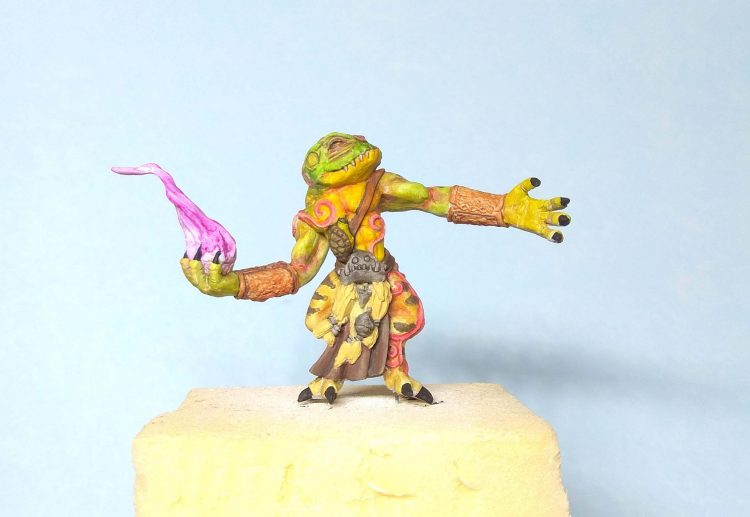
Toad, frog or turtle? – Froadle!
I have to admit, it is an odd miniature proportion wise and looks not really like a toad or a frog, but something in between with a bit of turtle mixed in. The head shape is akin to a frog, but doesn’t really look like a toad. The skin is smooth like a frog’s, and not warty. Hands and feet have claws, but no webbing. The froadle has teeth and either a six pack or some kind of armoured belly. The front legs are oddly elongated, while the hind legs are stumpy and slightly bent. I would have expected the opposite.
All that said, it is a chaos toad after all. So I assume it is heavily mutated and just a toad by name. It offers nicely sculpted front detail, with a delightful hip flask made out of a turtle shell, a nice belt buckle that gives me Aztec vibes and a little shrunken head. I am not sure about the scars on its skin, especially given frogs and toads don’t seem to develop scar tissue. Yes, it is fantasy I know. I am only half serious, but somehow my brain comes up with that line of questioning. You can stop rolling your eyes now. In my defense, I made an attempt to sculpt my own athropomorphic toad, so you will be the judge which concept works better.
One more serious issue was the lack of claws on the outstretched hand. Looking at some more examples online, Pieper apparently decided to only sculpt them on the other hand. An easy fix with some Greenstuff, but I am not quite sure why Pieper made this decision.
What I find to be a really nice touch – and a challenge for the painter – is the chaos projectile in its hand. It looks like a fissured projectile containing raw chaos energy. If that is not cool, what is?
So, while I would not have bought it outside the contest, I warmed up to it and now this froadle is one of my favourite paint jobs!
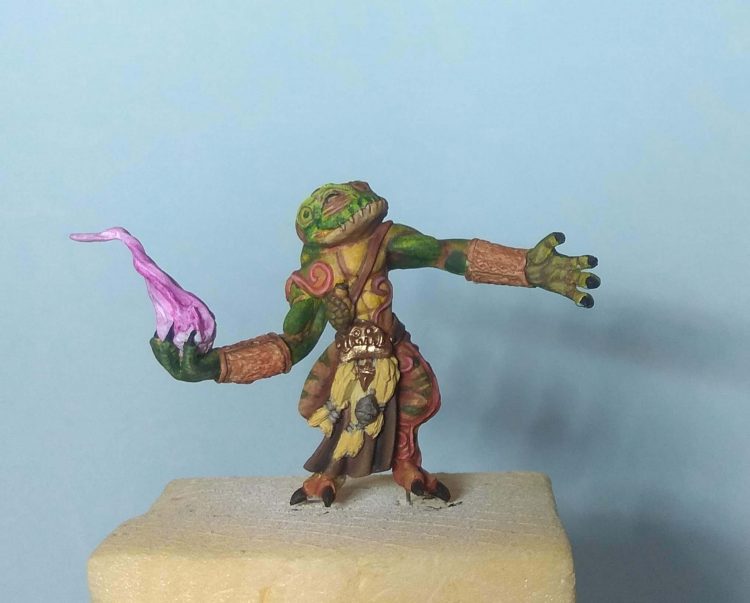
Painting the froadle – Kimera single pigment paints for the win!
I really wanted to up my painting game starting with the Chaos Toad competition. So I decided to invest in some single pigment colours. The idea behind this is, that most convenience mixes (but not all) contain a variety of pigments, sometimes a bit of white or black is also already mixed in. Naturally if you mix such paints, the results are unpredictable. You also will often get very desaturated colours with a greyish appearance. In addition it might be difficult if not impossible to mix a proper chromatic black. So I got myself a set of Kimera colours.
They won’t make you a better painter, but more control over your results is – at least in my opinion – important to get better. Price wise they are as expensive as other brands, but contain 30ml per dropper bottle and an agitator ball. They are also highly pigmented, which results in more vibrant colours.
The basic set is enough to mix every colour you can imagine, but you might still want some premixed flesh tones. I am not advocating to throw away your other paints by the way. You can mix and match. However, for the contest I decided to just use Kimera and take them for a spin. The only thing not-Kimera used is a Schminke Titanium white in the ‘hottest’ sections of the chaos projectile. For me mixing your own colours is an important step to advance: learning color theory by applying it.
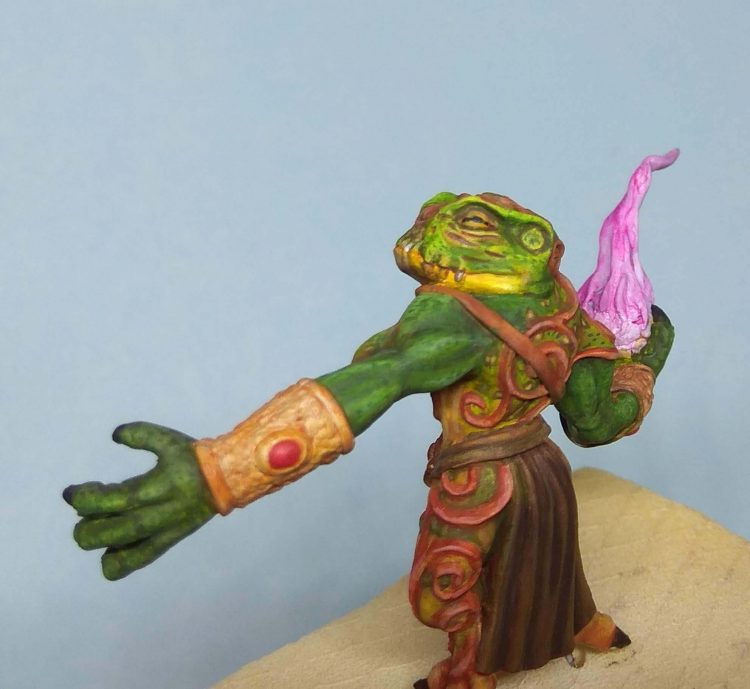
Chasing contrast- colours used
So, which of the colours did I use and where on the Chaos Toad? I am not able to take you through it step-by-step, as I mixed colours not only on my wet palette, but also on the miniature blending the skin and other areas. These days I usually add a drop or two of Vallejo Glaze medium to any paint I use. It slightly extends the drying time and makes any colour more transparent without it separating. Together with the wet palette it really makes your life much easier, less stressful and you can even come back a few days later using the same pre-mixed colours. That implies you can feather transitions on the miniature to get a smoother blend or colour shift a section applying a glaze .
The skintone is Pthalo green with some Cold Yellow mixed in and Red Oxide for the shadows (green and red can be used to make a chromatic black). The lighter skin sections are a Warm Yellow with Red Oxide for the darker areas.
My overall goal was to really push the contrast. This can be done with lighter and darker areas, but also with warm and cold colours (as in the two skin tones) and via saturation.
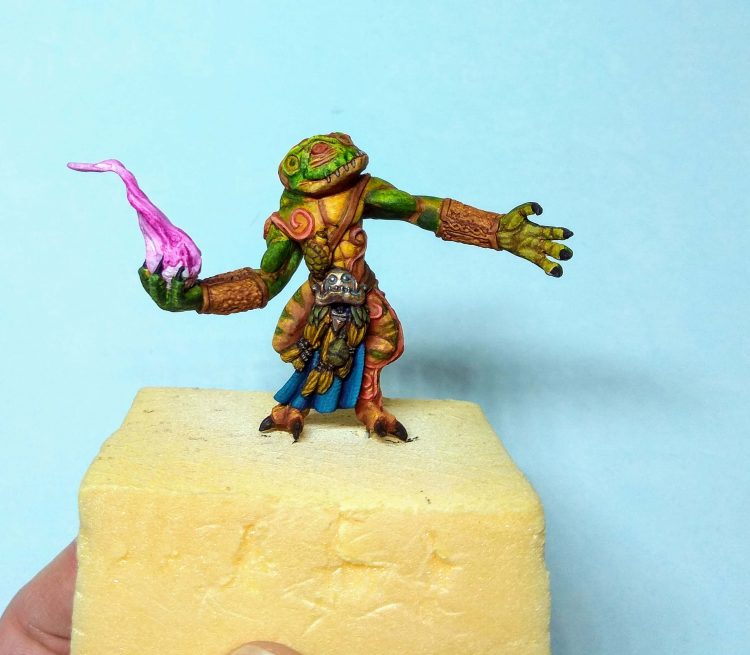
Two other areas that I wanted to add some interest to, were the Chaos Toad’s loin-cloth and the chaos projectile. The loin-cloth was painted using a Phtalo Blue Green Shade to work with the main skin tone, while contrasting with the warmer yellow skin. This time I darkened the blue mixing some Phtalo Green in it as well as some Carbon Black. Highlights were done with a bit of white mixed in. A subtle texture provided even more contrast to the surrounding sections.
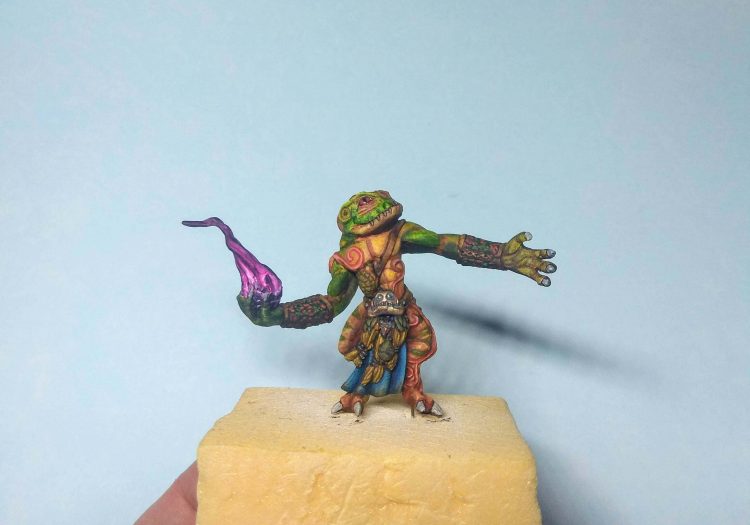
The chaos projectile was supposed to burn from the inside, but I decided to go for daytime conditions. So no OSL effect. Truth be told, this would have been my first serious attempt at OSL (instead this ghost got the honour) and I didn’t want to ruin the paint job a few days before the deadline. The chaos projectile goes from a Carbon Black with a bit of Violet mixed in to Magenta and up to pure Titanium White.
The swamp base
What about the swamp base? The base was a reasonably simple affair. I used a mossy twig from the great outdoors and cut it to size. The water effect was done adding a bit of murky green to Modge Podge Gloss, and the tall grass was made using tinted straw fibres. One challenge was to place the Chaos Toad on the twig. The claws didn’t quite fit and there was a bit of overhang. However, there was an easy fix. I just added some rocks and moss to frame the twig and to give the claws something to rest on.
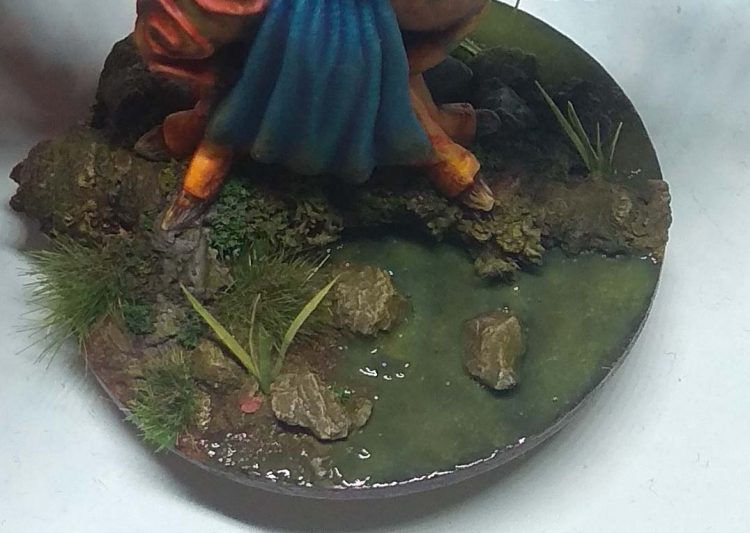
So, one last question to answer: did my rendition of the Chaos Toad place? No, unfortunately not. The competition was strong and some really excellent submissions deservedly won. You can check them all out if you are on Facebook!
There we go. You survived trespassing Bufo territory and hopefully got inspired to paint a frog yourself. If you have any specific questions about the paint job feel free to ask below. As this is the last post before Christmas, I wish you a very pleasant festive season and hope you find something wargaming related under the Christmas tree. Christmas or not, always remember to wield your brush with honour!
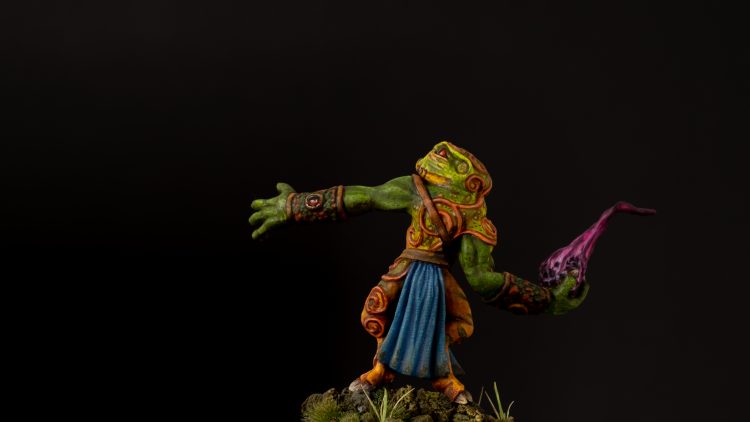
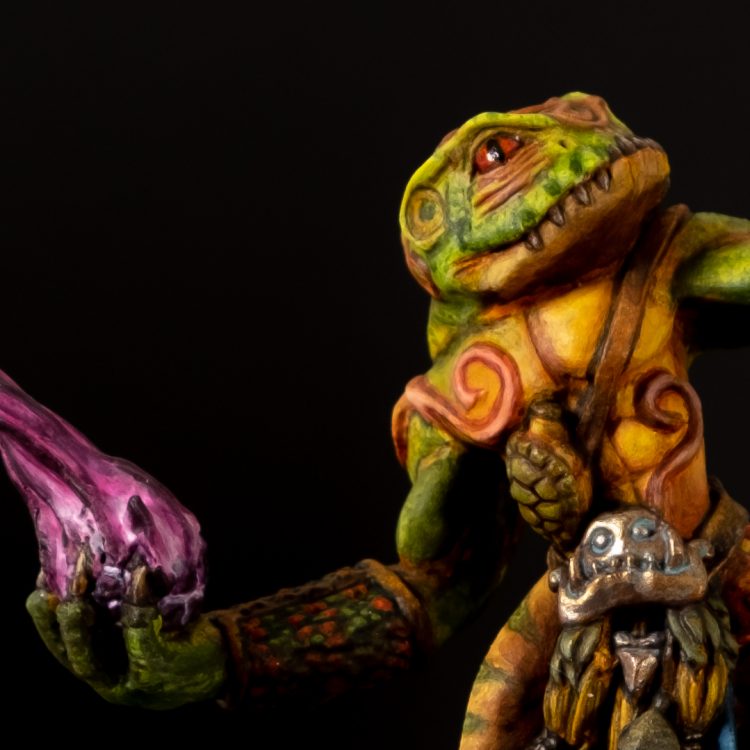
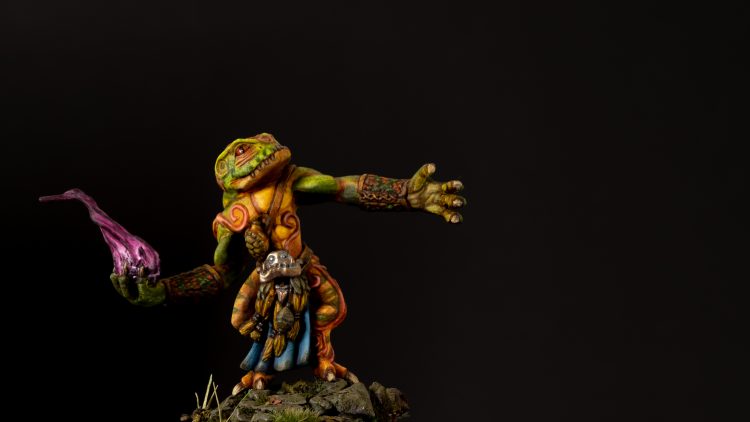
Fantastic paint job and basing!
Thank you Subedai. Much appreciated. I first wanted a more elaborate base, but the contest focused on the paint job. As I have more frogs in the pipeline, I will revisit the swamp base.
Great painting and the colour scheme works so well here. I really enjoyed the process pics showing how the model came together.
I’m also a convert to Bones Black. Only one model painted so far but very much a superior material to the soft white Bones.
Thank you Dave, much obliged. I had trouble to decide what colour scheme to go for, but in the end I went for natural tones, only broken up by the loin-cloth and projectile. I am glad the WIP pics helped to follow along. I am also a fan of the new material. Styrene plastic is still better to clean up, but I like how sturdy Bones Black is.
Beautiful blending and shading, looks as if it just crawled out of the swamp (and the base is great too).
Thank you kindly. It took me some time to get used to the Kimera colours. A little goes a long way and they need a bit more dilution (they are not quite heavy body, but not as thin as Vallejo) They do blend very well, however, and make excellent glazes.